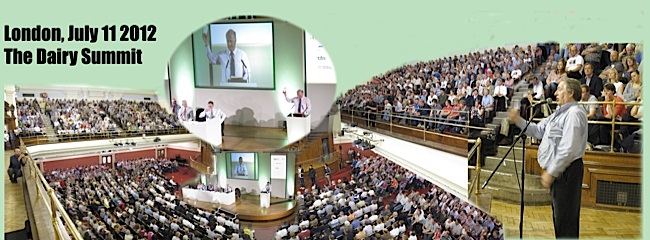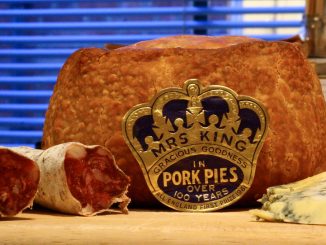UK farm minister Jim Paice had a rough ride from thousands of angry dairy farmers in London last Wednesday. Speaking in an overflowing Methodist Central Hall, he told dairy producers: “The government cannot fix prices, nor do I think it should.”
 He faces a capacity audience of about 2,500 at Methodist Central Hall, opposite the Houses of Parliament. There is not enough room in the building for all the farmers who have made the journey to London, and overflow meeting rooms are hurriedly set up to accommodate as many as possible.
He faces a capacity audience of about 2,500 at Methodist Central Hall, opposite the Houses of Parliament. There is not enough room in the building for all the farmers who have made the journey to London, and overflow meeting rooms are hurriedly set up to accommodate as many as possible.
The minister had been wrong-footed on the BBC Farming Today programme the day before when he was unable to tell a journalist the price of a pint (0.568 litres) of milk. From the platform he triumphantly holds aloft a pint of supermarket milk. “I’ve been shopping,” he announces. “I paid 49p for this pint of milk,” promptly spoiling the effect by holding up a bottle of water with the words: “…and I paid 59p for this bottle of water.”
He then adds, somewhat lamely: “…I know which is better value,” but he cannot conceal the fact that he lacks even crumbs of comfort. Everybody knows what it costs them to produce a pint of milk and they can all guess how much profit the retailer pockets from the bottled water.
Paice recounts a recent export promotion trip to China earlier this year, when a major UK pig industry export deal was struck. Visiting Chinese supermarkets, his advisers had found Dutch, Irish and Danish dairy products, but nothing from the UK.
The idea of trading chill chain goods halfway around the world strikes his audience as fanciful, but they hear him out. However, when he earnestly implores the listening dairy farmers to review their production costs, the audience boils over. The exasperated milk producers realise just how little he has to offer when the minister trots out a standard supermarket buyer response to news of higher input costs.
The only administrative fig leaf that Paice can use to cover his predicament is the ongoing discussion between dairy producers and processors to agree a voluntary code of practice. The minister is keen to see a voluntary agreement, since an EU-standard contract would be “imposed.” The meeting learns that earlier in the day, just a handful of words remain to be agreed in the current draft code, but this is just a promise of an ultimately unenforceable document.
The minister reminds those still listening that liquid milk is a static market that lacks the scope for growth of processed dairy foods. However, even those UK supermarkets buying liquid milk on a cost-plus basis are not extending this treatment to the added value of dairy products.
“Farmers need to work together because government price fixing is not coming back,” he later repeats. Dairy producers from as far away as Wales and Scotland are not in a mind to be fobbed off with excuses and from the floor speaker after speaker pours out his or her anger. They receive a ministerial apology to those who thought he was being patronising, but it is not what they have come so far to hear.
Paice may be the only member of the UK cabinet to have ever milked a cow, but he will do well to remember that dairy farmers, like cows, can kick back.





